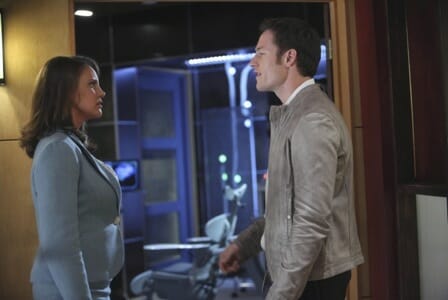Dollhouse: “Instinct” (Episode 2.2)

Dollhouse continues to move in jerks and sputters, but in the right direction nonetheless. The second episode of the season failed to maintain the quality of the last few episodes of the series but offered intriguing glimpses and interesting insight into the central characters.
In this episode, Echo goes on assignment as a wife and mother. Topher has modified her to the extent that she lactates. When the husband/father calls off the Dollhouse engagement, the maternal bond proves stronger than the wipe, and she tries to save the baby from the danger she thinks it’s in. DeWitt convinces Mellie/November/Madeline to come in for treatment, where she runs into Ballard and explains how she came to the Dollhouse. We also see a little more of Senator Perrin and his early investigation of the Dollhouse.
The engagement part of the episode suffers from the problem that’s plagued Dollhouse since the beginning. It’s hard to build three-dimensional characters you care about out of such transient characters. This is obviously a challenge for the non-recurring characters, but even for the regulars who are dolls, it’s a challenge. You care about how the assignment will affect Echo, but that’s the extent. Bringing in another doll, Sierra, to play her persona’s friend just heightens your awareness of how inconsequential, in and of itself, this all is. The writers also play the husband as a dark, mysterious person for the first half of the episode. Why is he so cold? Why does he lock his study, stay away from home, and have hushed phone conversations? Ultimately, he proves sympathetic. You find out that his wife died in childbirth and he’s had problems bonding with his son ever since. It’s standard misdirection. They would have been better off playing him sympathetically from the beginning, given our reluctance to invest in the character anyway. Echo’s breast feeding someone else’s baby was, of course, disturbing. That’s the point—highlighting the lack of boundaries in the Dollhouse. The unbelievability of this storyline was more disturbing. How long was this assignment supposed to last? It had to be relatively short-term, given the limit on resources and the dolls contract. How could this not end badly for “mother,” son and husband, and what does that say about the Dollhouse, the client and even Ballard?
At this point, I’ve come to just accept the limitations of the episodic stories and look to the broader arcs and meaning. And here, the episode delivered. We get some deep and powerful glances into a number of the characters. The choices (conscious and unconscious) they’ve made and the inevitable costs are coming into sharp focus. Maternal instinct is referenced in the title, but I think it could also refer to survival instinct and its cost. In choosing to survive and the way we chose to live, what cost do we exact?
-

-

-

-

-

-

-

-

-

-

-

-

-

-

-

-

-

-

-

-

-

-

-

-

-

-

-

-

-

-

-

-

-

-

-

-

-

-

-

-








































